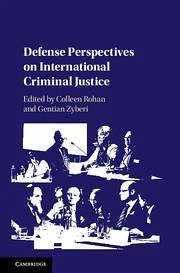Defense Perspectives on International Criminal Justice
Herausgeber: Zyberi, Gentian; Rohan, Colleen
Defense Perspectives on International Criminal Justice
Herausgeber: Zyberi, Gentian; Rohan, Colleen
- Gebundenes Buch
- Merkliste
- Auf die Merkliste
- Bewerten Bewerten
- Teilen
- Produkt teilen
- Produkterinnerung
- Produkterinnerung
In this book, leading international practitioners and scholars offer a unique defense perspective on the proper administration of international criminal justice.
Andere Kunden interessierten sich auch für
![The Six-Day War and Israeli Self-Defense The Six-Day War and Israeli Self-Defense]() John QuigleyThe Six-Day War and Israeli Self-Defense89,99 €
John QuigleyThe Six-Day War and Israeli Self-Defense89,99 €![Human Rights and Personal Self-Defense in International Law Human Rights and Personal Self-Defense in International Law]() Jan Arno HessbrueggeHuman Rights and Personal Self-Defense in International Law166,99 €
Jan Arno HessbrueggeHuman Rights and Personal Self-Defense in International Law166,99 €![Bringing International Fugitives to Justice Bringing International Fugitives to Justice]() David A SadoffBringing International Fugitives to Justice134,99 €
David A SadoffBringing International Fugitives to Justice134,99 €![The United States Department of Defense Law of War Manual The United States Department of Defense Law of War Manual]() The United States Department of Defense Law of War Manual126,99 €
The United States Department of Defense Law of War Manual126,99 €![In Defense of Your Freedom In Defense of Your Freedom]() Eugene DennisIn Defense of Your Freedom33,99 €
Eugene DennisIn Defense of Your Freedom33,99 €![Fairness and Rights in International Criminal Procedure Fairness and Rights in International Criminal Procedure]() Sophie RigneyFairness and Rights in International Criminal Procedure144,99 €
Sophie RigneyFairness and Rights in International Criminal Procedure144,99 €![Jiu-jitsu: a Comprehensive and Copiously Illustrated Treatise on the Wonderful Japanese Method of Attack and Self-defense Jiu-jitsu: a Comprehensive and Copiously Illustrated Treatise on the Wonderful Japanese Method of Attack and Self-defense]() Jiu-jitsu: a Comprehensive and Copiously Illustrated Treatise on the Wonderful Japanese Method of Attack and Self-defense34,99 €
Jiu-jitsu: a Comprehensive and Copiously Illustrated Treatise on the Wonderful Japanese Method of Attack and Self-defense34,99 €-
-
-
In this book, leading international practitioners and scholars offer a unique defense perspective on the proper administration of international criminal justice.
Hinweis: Dieser Artikel kann nur an eine deutsche Lieferadresse ausgeliefert werden.
Hinweis: Dieser Artikel kann nur an eine deutsche Lieferadresse ausgeliefert werden.
Produktdetails
- Produktdetails
- Verlag: Cambridge University Press
- Seitenzahl: 626
- Erscheinungstermin: 2. Juni 2017
- Englisch
- Abmessung: 229mm x 160mm x 38mm
- Gewicht: 998g
- ISBN-13: 9781107086678
- ISBN-10: 1107086671
- Artikelnr.: 48224026
- Herstellerkennzeichnung
- Libri GmbH
- Europaallee 1
- 36244 Bad Hersfeld
- gpsr@libri.de
- Verlag: Cambridge University Press
- Seitenzahl: 626
- Erscheinungstermin: 2. Juni 2017
- Englisch
- Abmessung: 229mm x 160mm x 38mm
- Gewicht: 998g
- ISBN-13: 9781107086678
- ISBN-10: 1107086671
- Artikelnr.: 48224026
- Herstellerkennzeichnung
- Libri GmbH
- Europaallee 1
- 36244 Bad Hersfeld
- gpsr@libri.de
On the administering of international criminal justice Judge Howard
Morrison, QC; Part I. A General Perspective on the Role and Function of the
Defense in International Criminal Proceedings: 1. The pioneering role of
the defense counsel in international criminal trials: from Nuremberg to The
Hague Geert-Jan Knoops; 2. Ethical standards in the practice of
international criminal law Colleen Rohan; 3. Who needs a lawyer anyway?
Self-representation and standby counsel in international criminal trials
Richard Harvey; 4. Navigating the tension between effective and efficient
legal counselling and respecting the formal rules of the tribunals: what
compass to use? Gentian Zyberi; Part II. Institutional Organization and
Concerns: 5. Defense organizations and offices at the international courts
and tribunals Dominic Kennedy and Isabel Düsterhöft; 6. Functional immunity
of the defense counsel and defense staff from prosecution before domestic
courts Semir Sali and Gentian Zyberi; 7. The principle of equality of arms
in international criminal proceedings Masha Fedorova; Part III. The Role of
the Defense during the Criminal Process: 8. The role of the defense in the
pre-trial stage Jens Dieckmann and Marie O'Leary; 9. The role of the
defense in the trial stage Michael Karnavas; 10. The role of the defense in
the appellate stage John Ackerman and Colleen Rohan; 11. Post-conviction
remedies and the residual mechanism Martin Petrov and Dejana Radisavljevic;
Part IV. Specific Aspects of the Work of the Defense: 12. Developing a case
theory and a defense strategy Gregor Guy-Smith; 13. Vaguely drawn maps and
dimly lit paths: rules governing admissibility of evidence at the ad hoc
tribunals (Part I) Wayne Jordash and Léa Kulinowski; 14. Vaguely drawn maps
and dimly lit paths: rules governing admissibility of evidence at the ad
hoc tribunals (Part II) Wayne Jordash and Léa Kulinowski; 15. Affirmative
defenses in international criminal proceedings Annie O'Reilly; 16. Defense
investigations and the collection of evidence Caroline Buisman and David
Hooper; Part V. Concluding Observations: 17. A tale of four illusions: the
rights of the defense before international criminal tribunals Dov Jacobs.
Morrison, QC; Part I. A General Perspective on the Role and Function of the
Defense in International Criminal Proceedings: 1. The pioneering role of
the defense counsel in international criminal trials: from Nuremberg to The
Hague Geert-Jan Knoops; 2. Ethical standards in the practice of
international criminal law Colleen Rohan; 3. Who needs a lawyer anyway?
Self-representation and standby counsel in international criminal trials
Richard Harvey; 4. Navigating the tension between effective and efficient
legal counselling and respecting the formal rules of the tribunals: what
compass to use? Gentian Zyberi; Part II. Institutional Organization and
Concerns: 5. Defense organizations and offices at the international courts
and tribunals Dominic Kennedy and Isabel Düsterhöft; 6. Functional immunity
of the defense counsel and defense staff from prosecution before domestic
courts Semir Sali and Gentian Zyberi; 7. The principle of equality of arms
in international criminal proceedings Masha Fedorova; Part III. The Role of
the Defense during the Criminal Process: 8. The role of the defense in the
pre-trial stage Jens Dieckmann and Marie O'Leary; 9. The role of the
defense in the trial stage Michael Karnavas; 10. The role of the defense in
the appellate stage John Ackerman and Colleen Rohan; 11. Post-conviction
remedies and the residual mechanism Martin Petrov and Dejana Radisavljevic;
Part IV. Specific Aspects of the Work of the Defense: 12. Developing a case
theory and a defense strategy Gregor Guy-Smith; 13. Vaguely drawn maps and
dimly lit paths: rules governing admissibility of evidence at the ad hoc
tribunals (Part I) Wayne Jordash and Léa Kulinowski; 14. Vaguely drawn maps
and dimly lit paths: rules governing admissibility of evidence at the ad
hoc tribunals (Part II) Wayne Jordash and Léa Kulinowski; 15. Affirmative
defenses in international criminal proceedings Annie O'Reilly; 16. Defense
investigations and the collection of evidence Caroline Buisman and David
Hooper; Part V. Concluding Observations: 17. A tale of four illusions: the
rights of the defense before international criminal tribunals Dov Jacobs.
On the administering of international criminal justice Judge Howard
Morrison, QC; Part I. A General Perspective on the Role and Function of the
Defense in International Criminal Proceedings: 1. The pioneering role of
the defense counsel in international criminal trials: from Nuremberg to The
Hague Geert-Jan Knoops; 2. Ethical standards in the practice of
international criminal law Colleen Rohan; 3. Who needs a lawyer anyway?
Self-representation and standby counsel in international criminal trials
Richard Harvey; 4. Navigating the tension between effective and efficient
legal counselling and respecting the formal rules of the tribunals: what
compass to use? Gentian Zyberi; Part II. Institutional Organization and
Concerns: 5. Defense organizations and offices at the international courts
and tribunals Dominic Kennedy and Isabel Düsterhöft; 6. Functional immunity
of the defense counsel and defense staff from prosecution before domestic
courts Semir Sali and Gentian Zyberi; 7. The principle of equality of arms
in international criminal proceedings Masha Fedorova; Part III. The Role of
the Defense during the Criminal Process: 8. The role of the defense in the
pre-trial stage Jens Dieckmann and Marie O'Leary; 9. The role of the
defense in the trial stage Michael Karnavas; 10. The role of the defense in
the appellate stage John Ackerman and Colleen Rohan; 11. Post-conviction
remedies and the residual mechanism Martin Petrov and Dejana Radisavljevic;
Part IV. Specific Aspects of the Work of the Defense: 12. Developing a case
theory and a defense strategy Gregor Guy-Smith; 13. Vaguely drawn maps and
dimly lit paths: rules governing admissibility of evidence at the ad hoc
tribunals (Part I) Wayne Jordash and Léa Kulinowski; 14. Vaguely drawn maps
and dimly lit paths: rules governing admissibility of evidence at the ad
hoc tribunals (Part II) Wayne Jordash and Léa Kulinowski; 15. Affirmative
defenses in international criminal proceedings Annie O'Reilly; 16. Defense
investigations and the collection of evidence Caroline Buisman and David
Hooper; Part V. Concluding Observations: 17. A tale of four illusions: the
rights of the defense before international criminal tribunals Dov Jacobs.
Morrison, QC; Part I. A General Perspective on the Role and Function of the
Defense in International Criminal Proceedings: 1. The pioneering role of
the defense counsel in international criminal trials: from Nuremberg to The
Hague Geert-Jan Knoops; 2. Ethical standards in the practice of
international criminal law Colleen Rohan; 3. Who needs a lawyer anyway?
Self-representation and standby counsel in international criminal trials
Richard Harvey; 4. Navigating the tension between effective and efficient
legal counselling and respecting the formal rules of the tribunals: what
compass to use? Gentian Zyberi; Part II. Institutional Organization and
Concerns: 5. Defense organizations and offices at the international courts
and tribunals Dominic Kennedy and Isabel Düsterhöft; 6. Functional immunity
of the defense counsel and defense staff from prosecution before domestic
courts Semir Sali and Gentian Zyberi; 7. The principle of equality of arms
in international criminal proceedings Masha Fedorova; Part III. The Role of
the Defense during the Criminal Process: 8. The role of the defense in the
pre-trial stage Jens Dieckmann and Marie O'Leary; 9. The role of the
defense in the trial stage Michael Karnavas; 10. The role of the defense in
the appellate stage John Ackerman and Colleen Rohan; 11. Post-conviction
remedies and the residual mechanism Martin Petrov and Dejana Radisavljevic;
Part IV. Specific Aspects of the Work of the Defense: 12. Developing a case
theory and a defense strategy Gregor Guy-Smith; 13. Vaguely drawn maps and
dimly lit paths: rules governing admissibility of evidence at the ad hoc
tribunals (Part I) Wayne Jordash and Léa Kulinowski; 14. Vaguely drawn maps
and dimly lit paths: rules governing admissibility of evidence at the ad
hoc tribunals (Part II) Wayne Jordash and Léa Kulinowski; 15. Affirmative
defenses in international criminal proceedings Annie O'Reilly; 16. Defense
investigations and the collection of evidence Caroline Buisman and David
Hooper; Part V. Concluding Observations: 17. A tale of four illusions: the
rights of the defense before international criminal tribunals Dov Jacobs.








